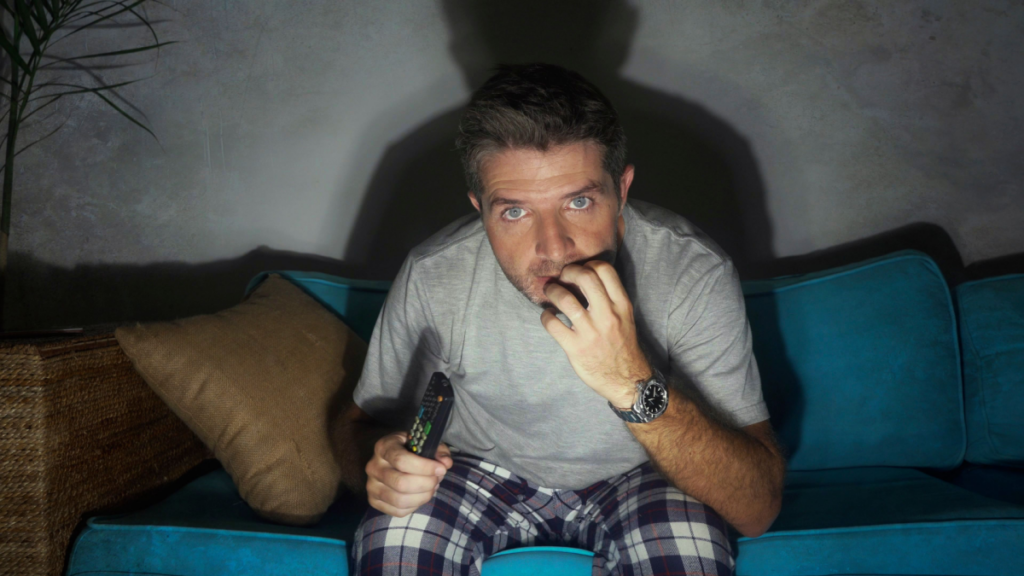How Your Brain Reacts to Thrillers


Written and verified by the psychologist Elena Sanz
Psycho, The Others, The Silence of the Lambs, and Shutter Island are great movie masterpieces that have enthralled viewers around the world. These films keep you glued to the screen as you hold your breath wondering what’ll happen next. Indeed, if you’re a lover of mystery and intrigue you’ll be familiar with these sensations. But, have you ever wondered how your brain reacts to these kinds of movies?
Knowing the answer to this question will help you understand why thrillers are so addictive and exciting. In fact, according to a study conducted by AMC Networks International, they rank as the second preferred genre behind science fiction. But, what makes them so special? The key can be found in your brain.

Defining suspense
Before analyzing how your brain reacts to thrillers, we’re going to review the genre itself. Thrillers don’t necessarily seek to suddenly scare the viewer or generate brief moments of surprise. On the contrary, they aim to generate a climate of sustained intrigue, involving the viewer in the scene that’s taking place.
In effect, you know that something important is going to happen, but you don’t know when or how it’ll unfold. It’s this anticipation of the development of the plot that keeps you alert, impatient, and in a state of tension.
In other words, you’re provided with the necessary prior information to anticipate certain ‘unpleasant’ outcomes, but not enough to eliminate the important element of uncertainty. Therefore, thrillers manage, like no other movie genre, to capture and maintain your interest.
How does your brain react to thrillers?
You experience the above sensations when enjoying a good thriller. However, what’s going on in your brain in the meantime? Several investigations have studied this phenomenon and their findings allow us to get closer to the answer. It seems that there are important effects on attention, perception, and memory.
The suspense absorbs your attention
Suspense has been found to alter visual processing. In one study, several volunteers watched clips from thrillers while flickering chessboards were shown on the periphery of the screen.
The researchers noted how, during the moments in which the narrative suspense increased, curious alterations in the pattern of brain activation occurred. More specifically, activity in the anterior calcarine sulcus (related to peripheral visual processing) was reduced. On the other hand, activity in the nodes of the ventral attention network (associated with central visual processing) increased. Therefore, narrative suspense produces a narrowing of attention or reduces the scope of attentional focus.
They involve the viewer in the narrative
Have you ever found yourself yelling at the screen as if you want to tell the characters what to do to escape their unfortunate fate? This is another of the great achievements of a good thriller. It engages you with the narrative. It involves you in a profound way in what you’re seeing.
In fact, this genre evokes your participation on behalf of the protagonists in danger. This doesn’t only happen in the cinema. For example, when you’re reading a book, you might engage in problem-solving when a certain character faces an uncertain and intriguing situation. Likewise, when you watch thrillers, you also initiate this same process of mental participation.
They impact your memory
One last curious fact regarding how your brain reacts to thrillers concerns your memory capacity. It’s been found that moments of high suspense are recalled more easily and with greater precision later. This may be due to the ability of the scenes and the narrative to fully involve you in what’s happening, thus awakening your alertness.

Thrillers help your brain to escape
All of the above findings lead to a clear conclusion: movies of this genre capture your attention, keep you continually reorienting yourself toward what’s happening on the screen, and detract your attention from anything else.
Therefore, you find that no environmental noise or daily worries have a place in your mind when you’re watching a good thriller. Perhaps this is why so many of us love them.
Psycho, The Others, The Silence of the Lambs, and Shutter Island are great movie masterpieces that have enthralled viewers around the world. These films keep you glued to the screen as you hold your breath wondering what’ll happen next. Indeed, if you’re a lover of mystery and intrigue you’ll be familiar with these sensations. But, have you ever wondered how your brain reacts to these kinds of movies?
Knowing the answer to this question will help you understand why thrillers are so addictive and exciting. In fact, according to a study conducted by AMC Networks International, they rank as the second preferred genre behind science fiction. But, what makes them so special? The key can be found in your brain.

Defining suspense
Before analyzing how your brain reacts to thrillers, we’re going to review the genre itself. Thrillers don’t necessarily seek to suddenly scare the viewer or generate brief moments of surprise. On the contrary, they aim to generate a climate of sustained intrigue, involving the viewer in the scene that’s taking place.
In effect, you know that something important is going to happen, but you don’t know when or how it’ll unfold. It’s this anticipation of the development of the plot that keeps you alert, impatient, and in a state of tension.
In other words, you’re provided with the necessary prior information to anticipate certain ‘unpleasant’ outcomes, but not enough to eliminate the important element of uncertainty. Therefore, thrillers manage, like no other movie genre, to capture and maintain your interest.
How does your brain react to thrillers?
You experience the above sensations when enjoying a good thriller. However, what’s going on in your brain in the meantime? Several investigations have studied this phenomenon and their findings allow us to get closer to the answer. It seems that there are important effects on attention, perception, and memory.
The suspense absorbs your attention
Suspense has been found to alter visual processing. In one study, several volunteers watched clips from thrillers while flickering chessboards were shown on the periphery of the screen.
The researchers noted how, during the moments in which the narrative suspense increased, curious alterations in the pattern of brain activation occurred. More specifically, activity in the anterior calcarine sulcus (related to peripheral visual processing) was reduced. On the other hand, activity in the nodes of the ventral attention network (associated with central visual processing) increased. Therefore, narrative suspense produces a narrowing of attention or reduces the scope of attentional focus.
They involve the viewer in the narrative
Have you ever found yourself yelling at the screen as if you want to tell the characters what to do to escape their unfortunate fate? This is another of the great achievements of a good thriller. It engages you with the narrative. It involves you in a profound way in what you’re seeing.
In fact, this genre evokes your participation on behalf of the protagonists in danger. This doesn’t only happen in the cinema. For example, when you’re reading a book, you might engage in problem-solving when a certain character faces an uncertain and intriguing situation. Likewise, when you watch thrillers, you also initiate this same process of mental participation.
They impact your memory
One last curious fact regarding how your brain reacts to thrillers concerns your memory capacity. It’s been found that moments of high suspense are recalled more easily and with greater precision later. This may be due to the ability of the scenes and the narrative to fully involve you in what’s happening, thus awakening your alertness.

Thrillers help your brain to escape
All of the above findings lead to a clear conclusion: movies of this genre capture your attention, keep you continually reorienting yourself toward what’s happening on the screen, and detract your attention from anything else.
Therefore, you find that no environmental noise or daily worries have a place in your mind when you’re watching a good thriller. Perhaps this is why so many of us love them.
All cited sources were thoroughly reviewed by our team to ensure their quality, reliability, currency, and validity. The bibliography of this article was considered reliable and of academic or scientific accuracy.
- Bezdek, M. A., Gerrig, R. J., Wenzel, W. G., Shin, J., Revill, K. P., & Schumacher, E. H. (2015). Neural evidence that suspense narrows attentional focus. Neuroscience, 303, 338-345.
- Bezdek, M. A., Keilholz, S. D., & Schumacher, E. H. (2021). Dynamic Brain Network States during Suspenseful Film Viewing. bioRxiv.
- Bezdek, M. A., Wenzel, W. G., & Schumacher, E. H. (2017). The effect of visual and musical suspense on brain activation and memory during naturalistic viewing. Biological Psychology, 129, 73-81.
This text is provided for informational purposes only and does not replace consultation with a professional. If in doubt, consult your specialist.







